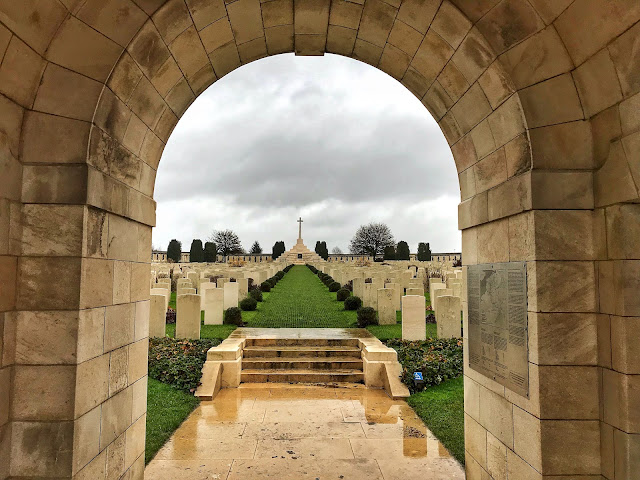'Serving the Mind, Body and Spirit: The YMCA's First World War Mission
This article is taken from a five minute presentation I gave to the Oxford History Graduate Network on 6th February 2018. It gives a brief overview of the YMCA's work in the First World War and introduces the starting point for my research.
The Young Men’s Christian Association is an interdenominational charity dedicated to providing social service and youth development. It was established in Britain in 1844, quickly expanding through missionary networks across the British Empire and the world. Parallel, sister organisations were developed in countries such as the USA from 1855.

Kathryn
The Young Men’s Christian Association is an interdenominational charity dedicated to providing social service and youth development. It was established in Britain in 1844, quickly expanding through missionary networks across the British Empire and the world. Parallel, sister organisations were developed in countries such as the USA from 1855.
The YMCA considered
the First World War to be its ‘supreme opportunity’ in which it could connect
with and influence the young men of the British Army. Certainly, the work of
its War Emergency Committee, under the control of General Secretary Sir Arthur
Keysall Yapp, brought the work of the YMCA to its largest ever audience and earned
support from across the military, political and religious authorities. From the
outbreak of war in 1914 the Association rapidly expanded and established a
network of recreation huts across the active fronts. By 1917, there were
thousands of these temporary structures, from the base camps of Salisbury Plain,
to dugouts on the Somme and marquees across the Sinai Desert. Soldiers recorded
how the YMCA became a ‘ubiquitous’ feature of their wartime experience.
Although a
Christian organisation, the YMCA was committedly non-proselytising and welcomed
men of all faiths and none. It was keen to avoid the nineteenth-century
missionary image of a conversionary force and instead championed a tri-fold
mission to serve ‘the mind, body and spirit’ of the ordinary man. This put the
emphasis, particularly in their war work, on caring for the man as a whole, not
only through spiritual comfort but also through fulfilling physical needs and
providing support for morale.

In terms of
the YMCA’s hut programme, this mission statement translated as the provision of
a comforting, safe space which it was hoped Tommies would view as their home.
If its activities were to be divided up according to the categories, it would
be entertainment and education representing the mind, refreshment and
relaxation for the body, and worship and fellowship for the spirit.
The YMCA won
most acclaim from the authorities for their entertainments. To curb the boredom
of camp and to provide escapism from the horrors of the front, the huts hosted
concert parties and cinema shows each evening. Not only did these serve to
entertain, with British performers travelling over specifically for the
purpose, but also provided the men with an alternative to the French estaminets
in which alcohol and vice were rife.
It is in
this way that the YMCA’s mission for the minds of soldiers connects with that
of the body. The huts were teetotal and the Association believed that there was
not one duty that a man couldn’t better perform sober. Instead, they served
free cups of tea and coffee, as well as hot cocoa on cold nights and Kia-ora
lemon juice in hotter climes. Cakes, chocolate and omelettes could also be
purchased, in addition to penny packs of branded cigarettes. A soldier could
then relax in the hut space where they could pen a letter home with the provided
complementary paper and envelopes, play board games, or enjoy a book from the
hut library.
While
enjoying such social comforts it was then hoped by the YMCA that men could be
encouraged towards their ultimate mission of Christian participation. The Association
was a pioneer of interdenominationalism with the British churches, and the huts
would usually run a daily prayer service open to soldiers of all Christian
backgrounds. In busier establishments there would often be a morning and evening
service, in addition to fellowship circles, Bible studies, and discussion
groups. On a Sunday they would then play host to a number of denominational
communions, led by locally-stationed chaplains. Jewish chaplains were also
welcome to host Saturday services in the hut. Reports and diaries suggest that
all forms of spiritual work were typically well-supported and benefitted both
regular churchgoers and those who considered themselves ‘lapsed’ from the
organised churches.
This is a
very crude break down of the overarching areas of the YMCA’s provisions. In
many instances it is difficult to place activities into one distinct category.
For instance, bodily refreshment could relieve the mind, and entertainments
could lift the spirit. Moreover, the YMCA found that often the ‘serving of a
cup of coffee to war-torn soldiers was as much Christian work as was the
preaching of a sermon.’ Thus they were able to engage the practices of social
religion into a pastoral care for the soldier as a whole being.
Kathryn



This comment has been removed by a blog administrator.
ReplyDelete